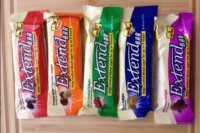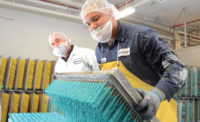Harnessing health: Herbaland Naturals grows to Canda's largest nutraceutical gummi manufacturer
Starchless mogul process gives company greater flexibility in developing new products.




Herbaland Naturals' co-founders, Musharaf Syed, ceo, and Aisha Yang, sales & marketing director, have seen the company double and triple sales on an anuual basis.

Nonlapan Somrang, R&D technologist, prepares a sugar-free, vegan, non-GMO formula on the bench by fi rst heating up the gummi liquid.

After spraying the mould with a release agent, she deposits the liquid manually onto the mould. Once the gummies are cured, the gummies are demoulded and subject to further testing.

Herbaland Naturals' R&D/QA team: (From l. to r.) Arisa Thamsuaidee, R&D technologist; Erica Dantas, QC; Owen Kenny, QC supervisor; Jarine Young, R&D technologist; Nonlapan Somrang, R&D technologist; and Seven Cai, R&D technologist.

The company's newest product launch features non-GMO, sugar-free, vegan vitamins and supplements.






















When Musharaf Syed decided to create a supplements business with Aisha Yang in 2009, their business plan didn’t call for a manufacturing facility. Rather, after heading up nutraceutical sales for seven years, Syed believed he, together with Yang’s international marketing experience, could successfully start their own business by filling gaps and niches in the global marketplace. Essentially, the plan was to develop products and let someone else manufacture them.
As so often happens in entrepreneurial endeavors, fate typically intervenes. One of the products the engineer-by-training and former sales/marketing executive wanted to launch was a gummi vitamin for children.
Few companies were producing the item and the category seemed ripe for further development. So Syed and Yang worked on developing a formula, and then having the gummies manufactured for them. The plan worked for about two years, with Syed and Yang simply focusing on product development and packing the gummi vitamins at their facility.
However, when their supplier was acquired by a larger company, Syed and Yang were informed that the new owner’s business model did not include producing gummies for private-label customers. Fortunately, they were given a year to help ease the transition.
It proved to be one of those “control your own destiny” lessons. After several inquiries about finding a replacement for the supplier, Syed opted to conduct his own research, traveling to Germany and Japan to view starchless moulding lines. In the end, he opted to construct a starchless mogul line from specific components under his supervision.
“About 60 percent of the components came from Taiwan, the remainder from Japan,” he explains. “The components were assembled in Canada. My background in engineering helped, allowing us to put the machine together.”
Syed’s reasons for going with a starchless moulding unit were many. First, it eliminated the use of starch, which not only simplified sanitation and processing complexity, but also minimized the operational footprint.

In addition, as John Bentley, sales manager for Herbaland points out, “Non-GMO starch is expensive to purchase. Having a starchless moulding process gives us much greater product flexibility, everything from non-GMO and vegan certification to sugar-free recipes. And, of course, it’s just a cleaner process.”
The small footprint also proved critical, given that the entire Herbaland operation was housed in a 5,000-sq.-ft. building. That constraint, nonetheless, proved minor compared to actually developing a tasty gummi vitamin for children.
“It took us six months of trial and error to get it right” Syed says. “Getting the texture to jell just right wasn’t easy.”
Nor was it easy to market the new line domestically, says Yang, the company’s sales and marketing director.
“I’ve been interested in supplements for the past 15 years,” she explains. “Having worked in sales and marketing for the airline industry, I had the opportunity to travel to more than 30 countries and see all sorts of supplements. Both Musharaf and I believed there was an opportunity to do the same here in Canada, so we decided to combine our strengths together.”
Initially, domestic distribution of the Herbaland line of supplements, which included three gummi vitamin products for children, was primarily in the Vancouver and British Columbia area.
As Yang points out, “There was limited supply of vitamin gummies domestically, which was what helped develop our own line.”
In addition, there was significant interest abroad, which focused on private-label inquiries for a broad range of customers, from retailers to manufacturers. One of the attractions to overseas customers involved Canada’s strict approval processes regarding the manufacturing of supplements.
The CGMP (Canadian Good Manufacturing Practice) number on a label authenticates inspection by the Canadian government, indicating that the manufacturer has passed muster, meeting all regulatory requirements and passing an on-site inspection.
Moreover, the company takes great pride in its quality assurance program.
“We track the product every step of the way, from formulation to depositing to packaging,” Yang asserts. “We continuously perform tests on the product on an hourly basis, checking for actives and label claims.”
That diligence didn’t go unnoticed. As Herbaland’s business grew abroad — “There were few suppliers in the marketplace,” she says — it, indeed, quickly became apparent that the gummi vitamin sector was really taking off.
An inquiry and eventual order from GNC Turkey affirmed Syed’s and Yang’s prescience about gummi vitamins in the supplements marketplace, not only for children, but for adults as well.
“We began to double and triple sales on an annual basis,” Syed says.
Yang recalls one of their business associates telling them that the gummi vitamins for children, “wouldn’t sell.” Obviously, that proved to be doubly wrong.
Not only were the gummi vitamins for children taking off, but gummi vitamins and supplements for adults, such Cog Gummy (for the brain), Flex Gummy (for joint health), Her Gummy (multi-vitamins and minerals for women), His Gummy (multivitamins and minerals for men), FVF Gummy (fruit, vitamins and fiber), Pure Slim Gummy (weight management), and Pure Sport Gummy (whey protein) were making inroads among consumers seeking a tasteful way to take supplements.
Moreover, given the company’s ability to customize formulations without worrying about the complications inherent in a starch mogul processing system, the company was able to work with private-label customers on distinct products.
“We employ scientists from the University of British Columbia on our staff,” Syed says. As the company’s website declares, “Our enthusiastic team of talented professionals has a wealth of experience in food and nutritional sciences, phytochemistry, microbiology, herbal medicine and pharmaceutical manufacturing, providing us with a solid scientific basis for research and development.”
Led by Syed and Yang, the group, which is supported by a cadre of equally talented quality assurance professionals, willingly accepts challenges from the marketplace and internally.
One of the first challenges the group and the company faced was meeting capacity. It quickly became apparent that another starchless mogul line was needed to meet demand. This year, the company leased a 25,000-sq.-ft. facility in Richmond, B.C. Total investment for a new starchless mogul line, new packaging equipment and preparing the building for food manufacturing approached $1.2 million.
Having moved into its headquarters this August, the company began addressing demand that was spurred by two marketplace developments.
First, last fall, the company’s line of branded products was taken on by Purity Life Products, Canada’s largest health foods distributor. As Bentley explains, that changed the production scheduler’s requirements from 5,000 cases of branded product a year to 5,000 cases per month.
In conjunction with that move, the company decided to focus overseas sales on its own brand, touting the “Made in Canada” affiliation.
As Yang says, “Overseas buyers value the Canadian standard for manufacturing very highly, which simplifies us getting the proper certifications for export sales.”
Secondly, the company entered the U.S. marketplace as a private-label supplier. Within a short period of time, four major companies had contracted with Herbaland for specific gummi vitamin/supplements products.
To accommodate the increased demand, the company operates two shifts, running two starchless mogul lines Monday through Friday. Packaging operates two shifts as well, although the department often continues working on Saturdays. Output from two shifts reaches 6 tons daily.
The second challenge the company faced involved an internal one: Developing a sugar-free, non-GMO and vegan gummi vitamin/supplement line. As it turns out, this challenge — proved to be a personal quest. Syed has diabetes and he was greatly interested in offering a sugar-free option in gummi vitamins and supplements.
Although the company does produce gelatin-based gummi products, Syed favors pectin-based gummies because of the flavor delivery. While curing pectin-based gummies takes longer — the curing process takes 48 hours and involves precise cooling temperatures compared to gelatin, which normally only requires a 37°-38° C heat level — they do deliver a long shelf life, up to three years.
Nonetheless, coming up with a sugar-free gummi using pectin proved incredibly challenging. As Yang explains, “Pectin requires sugar to bind; hence, it took us a while to overcome that challenge.”
A year in development, the company will roll out its new non-GMO, vegan and sugar-free line this fourth quarter. Consumers will be able to purchase gummies with the following vitamins and/or supplements: multivitamin; calcium; vegan with D3, fiber, green coffee bean (weight suppressant) and eye care for adults.
All of the gummies are certified vegan (the D3 is sourced from lichen and not sheep’s wool) and sweetness comes from isomaltoogliosoaccharide known as IMO. Herbaland uses an IMO known as VitaFiber.
“Typically IMOs are made from corn or tapioca syrups,” Bentley says. “VitaFiber uses tapioca, which doesn’t upset the stomach and has a low Glycemic Index.”
Thanks to an expanded R&D and QA department, the company also looks to roll out vegan, non-GMO, sugar-free protein-based gummi supplements as well as one for hair, skin and nails.
“The protein-based gummi will use a pea protein,” Bentley says. “And while there are already hair, skin and nail supplements on the market, there’s no one out there that has a sugar-free, vegan, non-GMO offering.”
And let’s not forget Syed’s latest project, a dual-texture gummi vitamin or supplement.
“We have the capability to do one-shot gummies consisting of a different texture center,” he says. “It’s just we haven’t had time to test it.”
As Bentley matter-of-factly states, "We're already running two shifts and we're close to capacity."
Syed agrees, but he’s being slightly cautious about expansion. The company could always add a third shift, although finding and training people for “graveyard” hours is an issue. The other option is to acquire another building, between 50,000 and 100,000 sq. ft.
“We could easily put in three more starchless mogul lines,” Syed says. It’s a decision the management team is grappling with, albeit a challenge most companies would want to have.
“I still can’t believe how fast we’ve grown,” he adds. And there are no signs of that growth abating.
At-a-Glance: Herbaland Naturals Inc.
Headquarters: Richmond, B.C., Canada
Plant/warehousing/offices: 25,000 sq. ft.
Employees: 50
Sales: $10 million (Candy Industry estimate)
Product: Gummi vitamins/supplements; capsule and pill vitamins/supplements
Output: 6 tons daily
Looking for a reprint of this article?
From high-res PDFs to custom plaques, order your copy today!






















